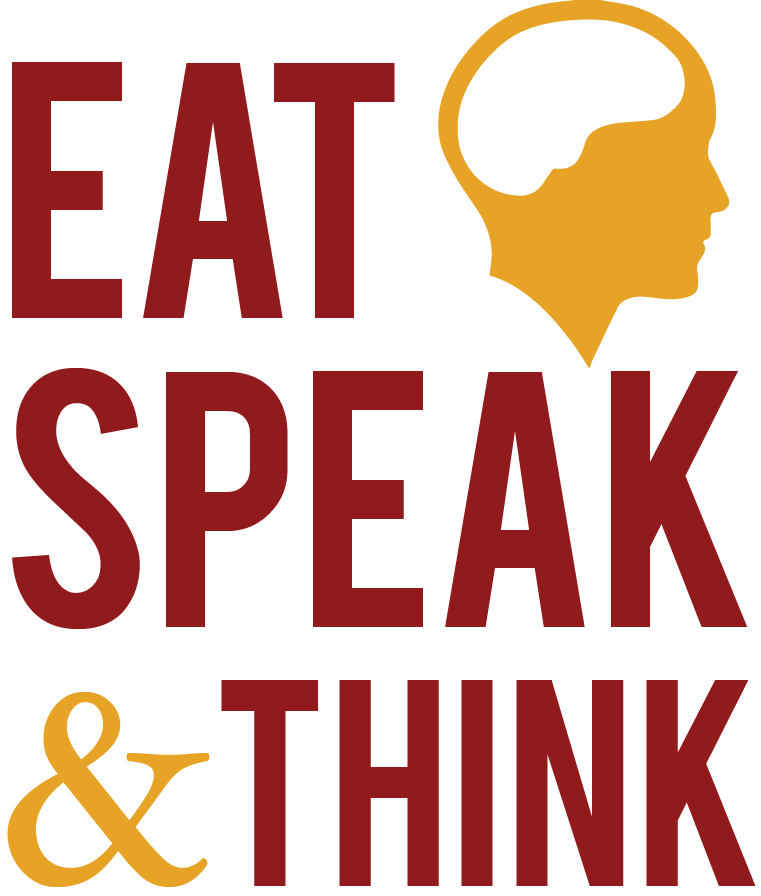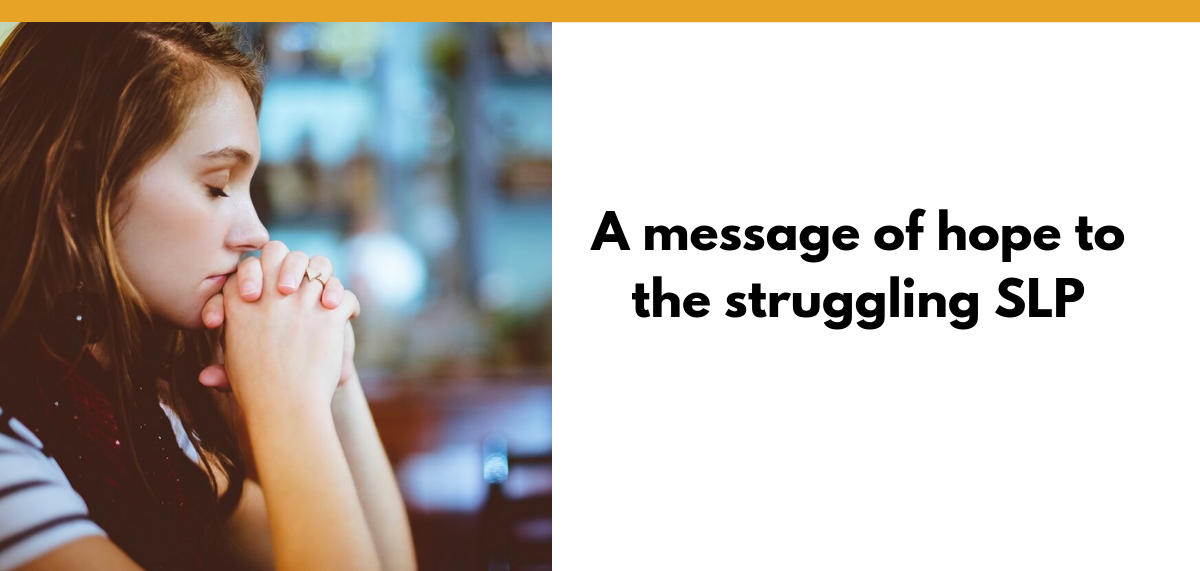Are you a struggling speech-language pathologist? Feeling over-whelmed or burned out? If so, you’re not alone!
I wrote the first draft of this post in my journal this week, feeling overwhelmed and powerless at the problems our field is facing and my own struggles. I felt better by the end of it (journaling often has this effect on me).
If you’re a struggling speech-language pathologist (SLP), I hope it helps you too.
Free DIRECT download: Message of hope to the struggling SLP (essay). (Email subscribers get free access to all the resources in the Free Subscription Library.)
Being an SLP is hard
It’s hard to work alone without the support of other SLPs.
It’s dispiriting to work in an area where some SLPs seem happy to operate on the basis of decades-old knowledge, skills, and materials.
It’s overwhelming to realize that you don’t know everything there is to know about your field, and you never will because there is just so much and it increases every day.
It feels terrible when you can’t dedicate enough waking hours to learning more in the hopes of finding that one new idea that could “cure” the patient sitting in front of you.
It’s hard to feel confident when your field keeps advancing but your employer can’t afford to provide you with discipline-specific continuing education opportunities or up-to-date assessment and therapy tools.
It’s confusing when your field seems full of conflicting information and opinions and precious little evidence.
It’s dismaying when the patient in front of you doesn’t fit the profile of any relevant research study you’ve found, but you still have to figure out how to help them.
It’s daunting when CMS and your employer asks more and more of you while taking little off your plate.
It’s soul-crushing to expect so much of yourself and be discouraged by the gaps in your knowledge, skills, and resources.
Being an SLP is hard, but then again, you’re doing a hard thing.
People are not widgets
If you wanted easy, you’d be stacking widgets on shelves for a living.
It would be one thing if science, medicine, and psychology had people all figured out. And all you had to do was seek out the answers.
But no one has all the answers.
As a field, we’re still learning what “normal” is, let alone how it goes wrong and how to fix it.
Therapy isn’t math, where you can input the variables and hit the “compute” button and have your answers displayed on the screen.
Experimental science? Theory-informed art?
What you do is experimental science; every patient a mini-experiment. Or theory-informed art. Or some mixture.
The person you’re working with, your patient, is a messy human being, with lots of variables and idiosyncratic characteristics. Someone with a lifetime of experiences who’s damaged or broken in some way. Changed in a way that interferes with living life the way they want.
And you have your own messy knowledge and skills. Gaps of known things you haven’t learned yet. Gaps of unknown things that no one yet knows. You have the skills and tools you need and the resources to find answers. Or you don’t.
You have your own stresses, your own variables and idiosyncratic characteristics. Your own messy life.
And somehow, in that chaotic blend of half-known knowledge and skill, the lack of ideal resources, and the messy human variables, you achieve great things.
You change the lives of the people you work with
Because of you, someone can talk clearly.
Because of you, someone can express their innermost thoughts.
Because of you, someone can enjoy meals with their friends and family.
Because of you, someone can remember the information that’s important to them.
Because of you, someone can remain safely in the home they’ve spent their entire adult life in.
Because of you, someone has successfully recreated their identity after life-changing loss.
Because of you, someone has accepted inevitable change and maximized their potential.
Because of you, someone felt understood and comforted.
And the benefit isn’t uni-directional.
The people you work with change your life
You are touched when the people you work with care about you in return.
You are inspired by the courage you see in people facing disappointment and adversity.
You learn to appreciate the many ways that families express love, respect, and support.
You realize that appearances can be deceiving. People are often dealing with far more loss and hurt and tragedy than you realize.
You feel blessed to work in a career that you love, knowing that you often make a real difference to people.
You take heart knowing that you’re “paying it forward”. Someday, you or a loved one will need assistance. With any luck, they’ll work with someone as dedicated and caring as you.
Because even though you’re not perfect and all-knowing, you’re doing the best you can. You’re making an honest effort to keep your skills fresh.
Focus on the gain, not on the gap
“Focus on the gain, not the gap.” (I heard Michael Hyatt talk about this with Ruth Soukup in the Do It Scared podcast.)
You know how overwhelming it is to focus on the gap, on any area where you’re falling short.
And honestly, you know that the gap for many in our field is pretty big.
Since our knowledge base grows larger every day, it’s a losing proposition to aim to master everything.
Instead, focus on the gain.
Celebrate the fact that you know more today compared to a year ago.
Plan to learn one new thing a month. Maybe take advantage of ASHA’s Perspectives of the SIGs.
Or plan to learn one new thing a week. Listen to a podcast related to our field.
And when you learn something new, something you think you may use, write it down. Plan to try it out.
Tell a fellow clinician about it. Teaching is a great way to learn.
It’s why I’m writing this blog. I’m learning as I write. I’m trying to expand my practice one new idea at a time. And I want to share what I’m learning with you.
Because you’re an amazing SLP, and you deserve to own your skills and confidently learn and apply new knowledge like the professional you are.
I hope my blog inspires you to try out one new idea in your practice!
Related Eat, Speak, & Think posts
- I wrote about five key changes I made to improve work-life balance after almost burning out in home health.
- Learn how organizing your work bag and your planner can save you time.
- Read seven tips to minimize your workload while still providing great care.
Free DIRECT download: Message of hope to the struggling SLP (essay). (Email subscribers get free access to all the resources in the Free Subscription Library.)
Featured image by Ben White on Unsplash.
Lisa earned her M.A. in Speech-Language Pathology from the University of Maryland, College Park and her M.A. in Linguistics from the University of California, San Diego.
She participated in research studies with the National Institute on Deafness and other Communication Disorders (NIDCD) and the University of Maryland in the areas of aphasia, Parkinson’s Disease, epilepsy, and fluency disorders.
Lisa has been working as a medical speech-language pathologist since 2008. She has a strong passion for evidence-based assessment and therapy, having earned five ASHA Awards for Professional Participation in Continuing Education.
She launched EatSpeakThink.com in June 2018 to help other clinicians be more successful working in home health, as well as to provide strategies and resources to people living with problems eating, speaking, or thinking.



Wow, so many SLPs in Facebook groups are commenting about how this captures how they feel and how inspirational this essay is. Thank you so much!
Posted with permission from Sierra Downs, SLP:
Lisa, your words resonate so deeply with me. There are obstacles and downright “soul-crushing” challenges in our field that sometimes feel insurmountable, especially with our current healthcare system – but the inspiring SLPs I have met and bonded with along the way have also shared equally soul-fulfilling stories of triumph and exciting discovery … My absolute favorite part of this job is making genuine connections with patients and their families, whether they meet their goals or not… There is always something to celebrate or a reason to connect.
I absolutely love your description of “theory-based art” also – We are people artists! I remember a grad school professor sharing a story of how he felt after a conversation with a neurosurgeon… He had a collaborative discussion with this MD and realized afterwards how much impact we have as SLPs – We help heal/reshape the brain from the outside.
Wow, thanks so much, Sierra, for sharing your thoughts. And for reaching out when the site wouldn’t let you post for some reason! (I’m not sure why that happened.)
I think we, as the health industry, have to find a way to manage expectations. We can’t humanly be 90% productive (or criss-cross the state) and complete therapy goals in a handful of visits, while documenting everything perfectly, while keeping up on advances with little to no budget for CEUs or materials, etc, etc.
So thank you again for taking the time to respond. Makes me feel less alone!
Julie Horner made this great comment on the SLPs in Home Health Care Facebook group and gave permission for me to share it here:
“You really articulated SO much of what I feel. I am going to print this and keep it in my HH company car glove box. Thank you Lisa Murray for putting into words so much of what I have been feeling.”
Thank you, Julie! I’ll come back to this comment the next time I’m struggling to finish a post!